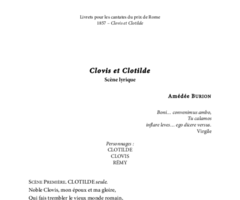Clovis et Clotilde
Cantata for the Prix de Rome competition
After failing in the Prix de Rome competition of 1853, when he did not get further than the preliminary round, Bizet was placed second with his cantata David in 1856. Although the following year, he was an obvious favourite to win the competition, the jury of the music section at the Académie des Beaux-Arts only awarded him second prize, preferring Charles Colin over him. However, this decision was overturned by the whole Académie, with representatives from all the arts, and the Premier Grand Prix was awarded to Bizet while Colin received the second Premier Grand Prix. Written by Amédée Burion, author of a series of religious works, the text of the cantata Clovis et Clotilde charts the conversion by the King of the Franks to Christianity through his wife Clotilde and Archbishop Rémy. Bizet’s treatment reveals his skill at operatic writing, even within the narrow framework of the conventions imposed by the Prix de Rome. While featuring the habitual illustrative aspect—prayer, battle “in the distance”, etc.—the score is brightened by some felicitous details of orchestration. For example, the Italianate romance “Il est si beau mon doux Sicambre”, in which Clotilde describes her absent husband, is offset by an elegant counterpoint played by the flute and oboe. One of the work’s gems, Clotilde’s prayer (no. 3), underpinned by muted strings, is a movingly lyrical piece which foreshadows the mature works of Gounod. Moreover, as noted by the musicologist, Winton Dean, Bizet was to reuse the duet no. 4 (the moment of Clovis’s conversion) in Les Pêcheurs de perles (Act II, no. 6 “Ô courageuse enfant”).


